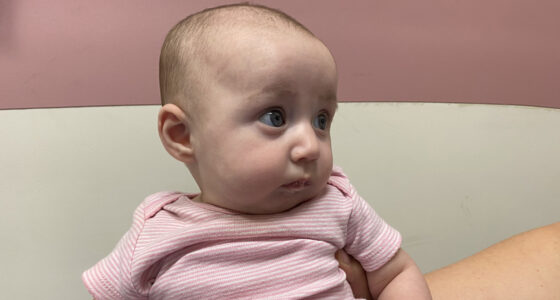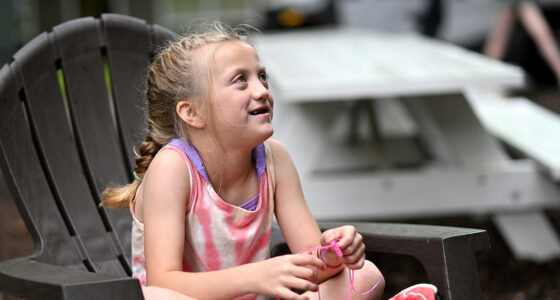
Cleft lip and cleft palate are the most common birth defects affecting the face. Cleft lip is a separation of the lip, and cleft palate is an opening in the roof of the mouth. Approximately 1 in 600 newborns in the United States has cleft lip and/or cleft palate.
Cleft lip and cleft palate each have specific symptoms.
In cleft lip, the cleft can be a small notch in the lip or a complete separation of not only the lip but also the gumline (alveolar ridge) and the floor of the nose. A cleft can affect one or both sides of the lip. Some children with cleft lip also have a nasal (related to the nose) deformity.
Like cleft lip, cleft palate varies in how it affects children. A cleft palate is an opening in the roof of the mouth that occurs when the two sides of the palate do not join together before birth. In some cases, the cleft involves only the uvula (the small U-shaped portion of the back of the palate that hangs down into the throat). In other cases, the cleft extends the entire length of the palate from the uvula to the gumline.
The causes of cleft lip and palate are not well understood. Most cases are spontaneous, meaning there is no known cause. Studies suggest that in some cases genetics may be involved along with environmental factors such as drugs, infections, maternal illness, maternal alcohol use and, possibly, deficiency of the B vitamin folic acid. In some cases, there can be a family history of cleft lip and palate
Cleft lip and cleft palate can cause problems with:
- Feeding. Most babies with cleft lip do not have trouble feeding. However, those who have cleft palate—or both cleft lip and cleft palate—often do have trouble feeding. A cleft in the roof of the mouth makes it difficult for the baby to suck forcefully enough to draw milk through a nipple.
- Hearing. Babies with cleft palate are especially vulnerable to frequent ear infections and hearing issues due to the buildup of fluid in the middle ear. This fluid can block sound, making it difficult for the baby to hear. The hearing loss should not be permanent if it is treated properly during infancy and childhood.
- Speech. Children with cleft lip typically have normal or near normal speech. However, children with cleft palate may develop speech a bit more slowly than other children. Before the palate is repaired, the structure of the child’s mouth can make it difficult to form some sounds and words normally.
- Tooth development and alignment. Children with clefts may have problems with dental hygiene and tooth alignment. The number, size, shape and position of both the baby teeth and the adult (permanent) teeth can be affected by the cleft.
Diagnosis of Cleft Lip & Palate
A cleft lip can often be diagnosed prenatally (before birth) via a routine prenatal ultrasound. It is more difficult to diagnose a cleft palate prenatally due to the palate being less visible in ultrasound imaging.
If your baby receives a prenatal diagnosis of cleft lip and/or cleft palate, it is recommended that you and your family visit an experienced cleft team to discuss the concept of team care, your child’s timeline of care and your child’s medical needs prior to the birth of your baby. The Riley Cleft & Craniofacial Anomalies Program provides this service.
After your baby is born, a cleft lip and/or cleft palate diagnosis will be confirmed through a physical exam.
Treatments
Treatments
Treatments for cleft lip and cleft palate and related problems include:
- Surgery. Treatment of cleft lip and cleft palate consists of surgical reconstruction that is completed in stages. Your child's cleft and craniofacial team pays close attention to any related speech, hearing, middle ear or dental concerns. Cleft lip is typically repaired between ages 3 months and 5 months. Cleft palate is generally repaired in the first year of life. Both surgeries usually require an overnight stay in the hospital. Based on your child’s individual treatment plan, he or she may require additional procedures, such as jaw reconstruction, throughout childhood and adolescence.
- Ear tube insertion. If your child has fluid buildup in the ear as a result of cleft palate, a surgeon can insert a tiny tube into the eardrum to drain fluids and help prevent infection. An ear, nose and throat (ENT) surgeon performs this minor procedure. Surgeons at Riley Children's often perform this procedure at the time of a scheduled cleft surgery to reduce the number of visits needed.
- Speech therapy. The palate is important for making normal speech sounds. Your child may have trouble making some sounds when he or she begins to talk. He or she should see a speech pathologist who is experienced with children who have cleft palates. Speech therapy is often recommended. It is also important to encourage your child to talk to you to help develop these skills at home.
- Feeding education. If cleft palate makes feeding difficult for your baby, use of special nipples and careful positioning of your baby may be helpful. A feeding specialist can give you proper guidance regarding your baby’s individual feeding needs, and a dietitian can assess your baby’s caloric needs and make recommendations for proper weight gain. To find out if your baby can suck, swallow and breathe safely, the doctor may order oxygen level tests and special swallowing tests that are done by a video X-ray during feeding.
- Dental care. It is crucial that all children with a cleft lip and/or cleft palate obtain regular checkups by a pediatric dentist, especially since a child with a cleft can have crowded or abnormally shaped teeth, making cleaning difficult. With proper dental care, children born with clefts can have healthy teeth. Dental specialists and surgeons often work together to create long-term treatment plans for children as they grow.
- Orthodontia. A cleft of the palate or gumline often affects the eruption and alignment of permanent teeth. An orthodontist experienced with children who have clefts can assist with straightening teeth, directing growth of the jaw with various appliances and preparing the teeth for any necessary jaw surgery.
Doctors at Riley Children's strive to make the treatment process more efficient for your child and family through a multidisciplinary approach. Once a week, the Cleft & Craniofacial Anomalies Program makes available as many experts as possible—specialists in areas such as plastic surgery, oral surgery, otolaryngology, orthodontics, dentistry, speech pathology, audiology and developmental pediatrics. This reduces the number of times your family must travel to our facilities.
The Cleft & Craniofacial Anomalies Program is one of the largest and most experienced of its kind in the nation. In fact, the program cares for more children with cleft lip and/or cleft palate than any other hospital in Indiana. Our experts help set the national standard in cleft lip and palate care, providing comprehensive treatment to improve your child’s function and appearance.
Key Points to Remember
Key Points to Remember
- Cleft lip and cleft palate are the most common birth defects affecting the face, occurring in approximately 1 in 600 newborns.
- An infant may be born with a cleft lip, a cleft palate or a combination of both.
- The causes of cleft lip and cleft palate are not fully understood, but both genetic and environmental factors may be involved.
- These conditions can cause difficulties with feeding, hearing, speech and tooth development.
- Treatment of cleft lip and cleft palate consists of surgical procedures, speech therapy and dental/orthodontic treatment that begins at infancy and continues through adolescence.
Support Services & Resources
Support Services & Resources
Visit these trusted websites to learn more about cleft lip and cleft palate and find resources and support.
We offer a broad range of supportive services to make life better for families who choose us for their children's care.
This nonprofit organization exists to serve individuals and families affected by cleft lip and palate and other craniofacial conditions by connecting them to team care, providing education and offering personal support. It is the public service arm of the American Cleft Palate-Craniofacial Association.
This nonprofit organization addresses the medical, financial, psychosocial, emotional and educational concerns related to cleft lip and palate and other craniofacial conditions.
Locations
Locations
Locations
In addition to our primary hospital location at the Academic Health Center in Indianapolis, IN, we have convenient locations to better serve our communities throughout the state.
Sort through 3 facilities offering Cleft Lip & Palate care by entering your city or zip below.
Departments Treating This Condition
Departments Treating This Condition
Related Stories
Related Stories

Shiloh has the face of an angel
Baby born with cleft lip and palate is thriving as he approaches his first birthday. His lip has been repaired; next up is his palate surgery.
Continue reading
Cleft team helps guide baby’s growth
Ellie Darner was born with a cleft palate, which makes eating a challenge, but she is thriving under the care of Riley’s cleft and craniofacial team.
Continue reading






